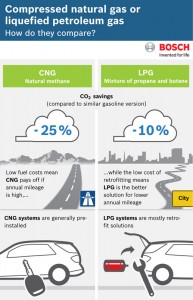The operating costs, service station networks, and conversion costs for compressed natural gas and liquefied petroleum gas
What are the advantages of gas-powered vehicles?

Both CNG and LPG powertrain systems are cheaper and more eco-friendly in cars than diesel or gasoline systems. Their combustion is comparably cleaner, reducing emissions of particulates and nitrogen oxides. Both fuels are also cheaper than gasoline or diesel. Thanks to low production costs and tax incentives, compressed natural gas (CNG) costs drivers up to 50 percent less. However, gas-powered vehicles are a little more expensive to buy than gasoline-powered ones, because they are generally equipped with two fuel systems (gasoline and CNG/LPG). More and more automakers are offering CNG vehicles ex works, with the difference in price comparable to that between diesel and gasoline variants. In Germany, CNG powertrains in passenger cars pay off as soon as annual mileage exceeds 7,000 kilometers. Compared with a conventional gasoline engine, a gas-powered vehicle generating the same power will emit 25 percent less CO2. This is due to the chemical properties of this fuel source. The CO2 savings offered by liquefied petroleum gas (LPG) are somewhat lower – but then it is somewhat cheaper to convert a vehicle to LPG than it is to buy a CNG system ex works.
“Naturalgas systems already have the potential to reduce CO2 emissions at little extra cost. Technologically, this is an area in which Bosch components lead the way. However, CNG-powered vehicles will become more popular in the market only if the infrastructure is significantly expanded.” (Dr. Volkmar Denner, chairman of the board of management of Robert Bosch GmbH, responsible for research and development)
LPG or CNG – which fuel is cheaper?
In Germany, both fuels enjoy tax incentives, which will last until 2018. On the sign outside a service station, LPG can often seem cheaper than CNG. But that is only half the story. CNG, a gas, is priced in kilograms, while LPG, a liquid, is priced in liters. “If all you go on is the prices advertised at service stations, then you’re comparing apples with oranges,” says Heiko Kaiser, a gas systems expert at Bosch. After all, one kilogram of CNG contains the same energy as around two liters of LPG. Expressed another way, it is around a third cheaper to obtain one kilowatt-hour of energy from CNG than it is from LPG.
Is it better to convert or buy ex works?
While a number of automakers are now offering CNG systems ex works, LPG systems often still come as retrofit solutions. This involves taking the vehicle to a workshop and having it fitted with a second fuel system. Since these retrofit systems generally offer nothing like the quality or durability of an OEM system, additional costs and visits to the workshop are almost guaranteed. It’s a different story with CNG cars, since these systems are almost always integrated into the vehicle ex works. The Volkswagen Group, Fiat, and Opel, for instance, all offer new vehicles fitted with Bosch CNG systems. These vehicles leave the same impression of quality and longevity as comparable variants equipped with gasoline systems. They can switch back and forth between CNG and gasoline whenever necessary, without the driver noticing. The Bosch system can start on CNG even when it is cold, which means that customers can practically always drive on the more cheaply priced CNG. Other systems have to use expensive gasoline to warm up in the start-up phase.
Where can I fill up on LPG and CNG?
Currently, the LPG network in Germany stretches to some 6,500 service stations. CNG service stations are also becoming more widespread; there are already around 1,000 of them. What’s more, virtually all vehicles fitted with a CNG system ex works also feature a small reserve tank for gasoline. “The gasoline reserve tank guarantees mobility even if there is no CNG service station nearby,” says Heiko Kaiser. Apps and navigation systems can also help locate the nearest service station.
CNG or LPG – what’s the difference?
Compressed natural gas – CNG for short – is made up of molecules of CH4. This combination of one carbon atom with four hydrogen atoms carries a lot of energy. Natural gas is also used in heating systems and in gas ranges. Liquefied petroleum gas – LPG for short – is a mixture of propane (C3H8), propylene (C3H6), butane (C4H10), and butylene (C4H8). This is the mixture often found in camping stoves. LPG’s exact composition varies from region to region. In Germany, for instance, LPG is largely made up of propane and propylene. In France, however, it is largely made up of butane and butylene. It is the composition of a given blend of LPG that determines its antiknock quality and the rate at which fuel is consumed. For instance, LPG rich in butane carries a lot more energy than LPG rich in propane. In winter, drivers of LPG vehicles must be sure to fill up with what is known as “winter gas,” which contains a higher proportion of propane, since it is much more difficult to vaporize butane in the cold.
Video animation:
CNG powertrains
